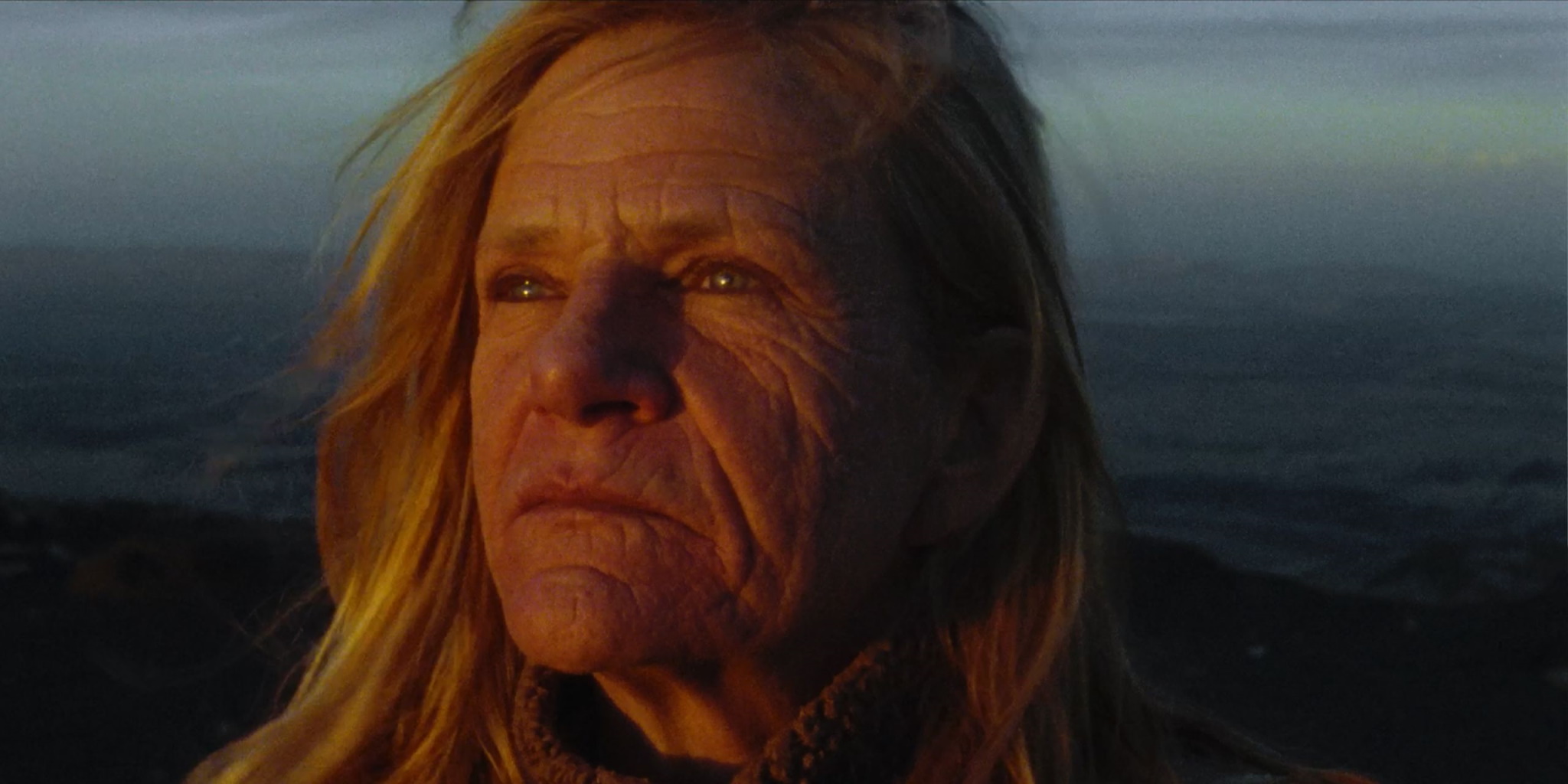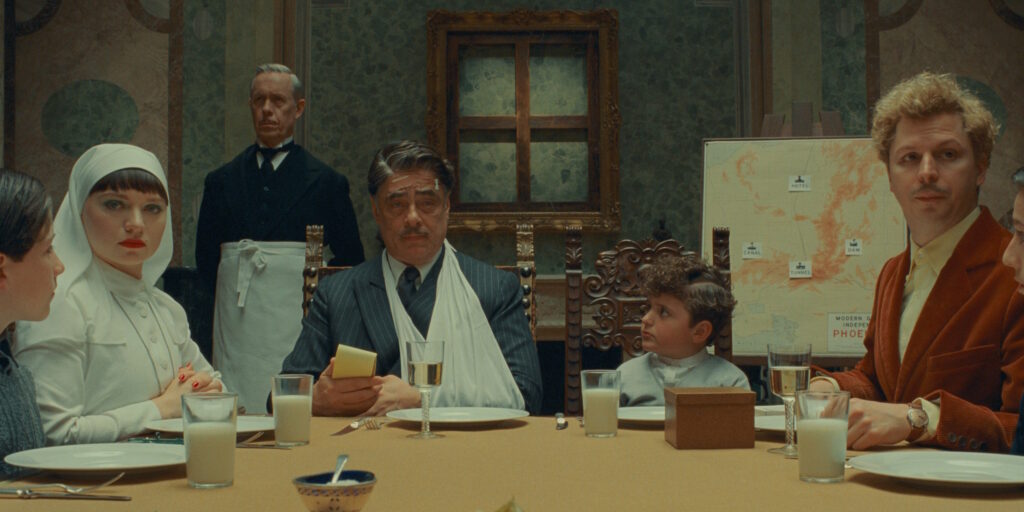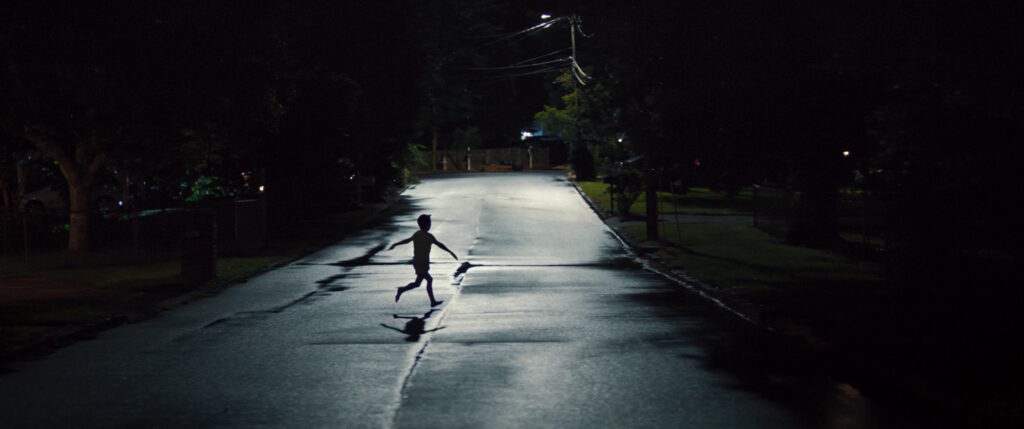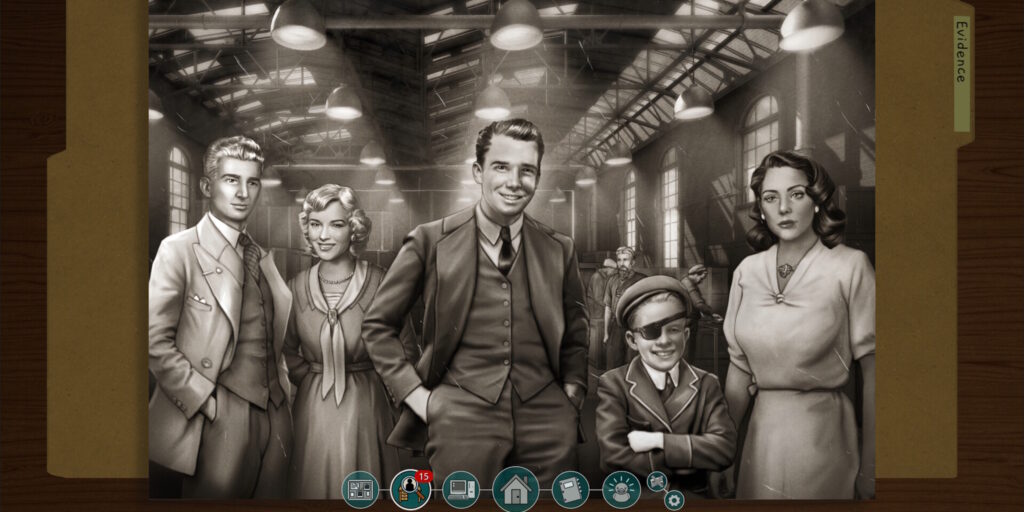[Originally published at Cinema St. Louis’ The Lens.]
Faye (Dale Dickey) is waiting. She’s unhitched her little trailer at Campsite No. 7 on a lakeshore nestled in Colorado’s high shrublands. She has a routine and a collection of small comforts: Café Bustelo coffee, Busch beer, a vintage transistor radio, and crawfish caught fresh from the lake’s still waters. She has exactly two books: Audubon field guides to North American birds and the night sky of the Northern Hemisphere. Her existence is unplugged and uncomplicated. Yet she seems vaguely anxious, and every time a visitor approaches her campsite, she smooths her T-shirt and adjusts her wild wisps of copper-orange hair. Clearly, Faye is expecting someone.
A Love Song, the feature debut from writer-director Max Walker-Silverman (“Chuj Boys of Summer”) unfolds in a pleasant, low-fi, slightly eccentric version of American West. The exact year is not specified, but the most sophisticated technology glimpsed during the film’s 81 languid minutes is a pocket digital camera. This is a setting that will be recognizable to anyone who has seen a Sundance-feted indie dramedy or two. Faye’s visitors and neighbors at the lakeshore are all earnest, convivial folks, and her natural standoffishness does nothing to dissuade their overtures.
Leading a donkey whose saddlebags are overflowing with letters and packages, a friendly young postman makes his rounds of the campground, but he never seems to have any deliveries for Faye. A quartet of shovel-toting cowpokes stop by – improbably led by a precocious tween girl – looking for their father’s unmarked grave. (As their pint-sized ringleader explains, the recent installation of a nearby oil well has ruined her Pa’s view, and his remains are to be relocated.) A couple at a neighboring campsite invites Faye over for dinner, during which Marie (Beja K. Thomas) explains with affectionate exasperation that their engagement holiday has dragged on from days to weeks due to Jane’s (Michelle Wilson) hesitancy about officially popping the question.
These encounters are diverting, but Faye is plainly anticipating someone else’s arrival. By the time Lito (Wes Studi) finally turns up at the door to Faye’s trailer – clutching a hasty bouquet of yellow wildflowers, with a friendly black hound dog in tow – she has almost given up on his appearance. Both Dickey and Studi underplay this momentous meeting, allowing their characters to fumble charmingly through what is evidently a decades-later reunion. Walker-Silverman’s screenplay is as reticent as its lead characters, taking its time as it pulls back the curtain on their history. Faye and Lito were high-school classmates, and the campground was the setting for a school trip they remember fondly. They reminisce sparingly but warmly about happy memories, including a stolen kiss whose details they recall differently.
Both Faye and Lito are now widowed, but while Faye has never left the area, Lito departed for greener pastures at a young age. (Studi, ever the master at subtle character shading, allows the bitterness in his voice to suggest Lito’s encounters with anti-Native racism that A Love Song is otherwise reluctant to touch upon.) They share a simple, delightful day together. They swim in the lake (clothes on), play an acoustic guitar folk song together, and treat themselves to ice cream from Faye’s tiny freezer. An expectation of romantic possibility hangs in the air, but Faye might be on a slightly different page than Lito: As the sun starts to set, she makes the bed in her trailer, but meanwhile Lito is pitching a one-man tent in the scrub outside.
With her well-creased countenance and wild amber hair, the prolific Dickey (Winter’s Bone, Hell or High Water) is undoubtedly a recognizable face to many filmgoers, but A Love Song is remarkably her first starring performance. The film also offers an uncommon romantic lead role for Studi (Avatar, Hostiles), who gets to play against type as a soft-edged man whose gentleness may partly be a mask for his emotional timidity. Still, A Love Song is more Dickey’s showcase than it is a proper two-hander, given that a good chunk of this unhurried film’s running time involves watching Faye going about her off-the-grid routine, or simply musing silently on her heavy regrets and fleeting dreams.
As enamored as the film is with its lead actress’s hard-bitten features and pale, dewy eyes, one wishes that Walker-Silverman had trusted Dickey a little more to hold the viewer’s attention. A Love Song feels distended by Faye’s quirky, mannered interactions with secondary characters, many of whom seem like refugees from an abandoned Coen brothers feature. These encounters aren’t without their charms, but it often feels like there’s a much leaner, tighter (and yet still laid-back) 45-minute short film hiding somewhere inside Walker-Silverman’s feature, one more decisively focused on Dickey’s performance.
Still, there’s plenty to admire about A Love Song, which boasts a sweet-tempered atmosphere rich in lonely wistfulness. The film’s drama hinges on the ambiguity of Faye’s relationship to Lito – or, more accurately, on her decades-old what-if fantasies about him. In other words, it’s less a proper autumn-years love story than a character study about romantic longing, and how strange such feelings can seem once we attain a certain age. There comes a time when memories both cherished and painful vastly outweigh one’s hopes for the future. Yet Faye, despite a happy marriage and a lifetime of escapades – at one point she alludes to her wild years as a forest service pilot – can’t suppress her girlish tingle of expectation. The mere possibility of kindling something with this man sets her aflutter, notwithstanding her guarded self-consciousness. Does she truly feel something for Lito, or does she simply miss having a warm body in her bed? Maybe it’s both less and more than that: a rare chance to again savor that euphoric, shivery sensation of being on the precipice of something new.
A Love Song opens in select local theaters on Friday, Aug. 19.




